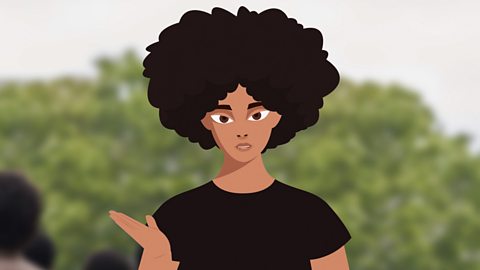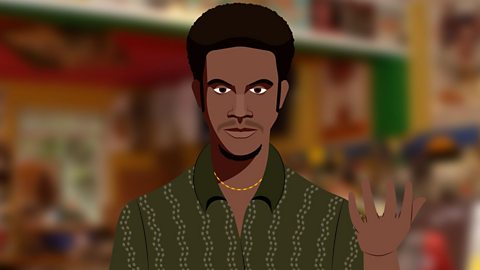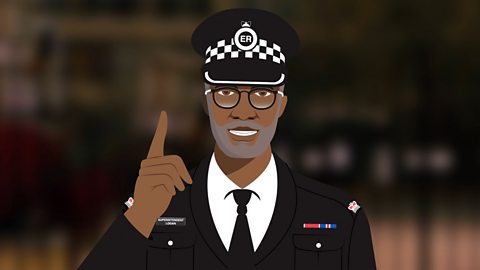Video summary
Micheal Ward, who plays Franklin in Steve McQueen's Small Axe, explores the eruption of Blues parties in London between the 1960s and 1980s.
Many black people were turned away from existing clubs and bars in London, Manchester, Birmingham and other cities in the 1960s. Which led to the creation of Blues parties, a tradition that began back in the West Indies in the 1950s, were black people could meet, dance and have a good time.
Organisers would clear out a flat or house, and set up huge speaker systems for a DJ to play a mix of ska, rocksteady, and reggae.
The music reflected their West Indian roots and spoke of the hardships of those who lived in the shanty towns before migrating to Britain as part of the Windrush generation.
They were unlicensed events that were held in residential areas, so noise was often complained about by neighbours. The organisers might be fined, but it wouldn't stop them. The following weekend they would just find another empty building and do it all over again.
Eventually, it became harder and harder to hold an event without being arrested and they stopped, but the stories and relationships they helped to build were vital.
Teacher Notes
This short film is suitable for teaching KS3 and KS4 students. It can be used alongside the other Small Axe 91╚╚▒Č Teach films or independently.
It could fit as part of a KS3 history curriculum when looking at ÔÇśsocial, cultural and technological change in post-war British society.ÔÇÖ For example, it could be integrated into an enquiry or scheme of work looking at migration to Britain or black British history.
At KS4, the film could be used to illustrate the experiences and treatment of migrants to Britain after World War Two as part of the AQA ÔÇśEmpire, Migration and the PeopleÔÇÖ course, the OCR ÔÇśMigrants to BritainÔÇÖ course or the forthcoming Edexcel Migration course.
Before watching the film:
You may want to introduce students to other relevant preceding events in post-war black British history to provide context. For example:
- the arrival of the Empire Windrush in 1948
- the 1948 British Nationality Act, which conferred equal citizenship status to people in Britain and her colonies.
- the Notting Hill riots in 1958 and murder of Kelso Cochrane in 1959
You may also want to elicit from the students what they already know about the Caribbean. You could offer prompts such as ÔÇśDifferent islandsÔÇÖ, ÔÇśHistoryÔÇÖ, ÔÇśFoodÔÇÖ, ÔÇśMusicÔÇÖ and ÔÇśLink to BritainÔÇÖ.
You could also ask students to consider why people who had moved from the Caribbean (who often referred to themselves as West Indians) might have held their own house parties. Students here might suggest a desire to have fun, to hang out with people who were similar to them, to temporarily escape from the challenges they faced in British society. You could capture their ideas and return to them once they have watched the video.
If looking at the films as interpretations of the post-war West Indian experience, you may want to introduce the students to Steve McQueen and his motivations for creating the Small Axe collection of films. There are a number of newspaper interviews that might be helpful in providing insight.
During watching the film:
You may want to pause the video at certain points to check for understanding. Alternatively, you could wait until the end and pose questions such as:
- What were Blues Parties?
- Where did they originate?
- Why does the actor Micheal Ward say that people went to Blues Parties?
- What could Blues Parties reveal to us about the experience of West Indian migrants to Britain?
- Why did they come to an end in the 1980s?
- Why do you think director Steve McQueen has chosen to make this film as part of his Small Axe collection of films?
Following on:
You could return to the studentsÔÇÖ initial ideas about why people went to Blues Parties. Is there anything they could add to them? If so, you could add what they picked up from the film in a different colour.
At KS4 this short film may serve as a case study or a way to illustrate experiences in a lesson about West Indian migration to post-war Britain.
However, there are several other potential avenues. The video could be used as a way in to exploring the ska, rocksteady and reggae music played at the parties. The exploration of music could then open out into looking at the post-war history of the Caribbean, perhaps with a focus on Jamaica.
Alternatively, you could keep the focus on Britain. One option here is to use look at the changing attitudes to the Caribbean presence in the UK through the lens of music. For example, the rise of ska and reggae and the creation of Two-Tone.
Another option is to look either at other interpretations of the West Indian experience or at contemporary source material. There are contemporary documentaries that you could play short sections of to deepen studentsÔÇÖ learning or to draw a comparison with McQueenÔÇÖs interpretation of Blues Parties. The National Archive and British Film Institute have a variety of different visual sources you could use in the classroom. There is also a range of oral history from the Windrush Generation exploring their experiences of living in Britain.
The Mangrove Nine. video
Rochenda Sandall, who plays one of The Mangrove Nine in Steve McQueen's Small Axe, tells the true story of this significant event in British history.

Alex Wheatle and the Brixton Uprising. video
In his own words, this is story of Alex Wheatle MBE, who grew up in a children's home and later became an award-winning writer of books for children and young adults.

Educationally Subnormal Schools. video
Kenyah Sandy, who plays Kingsley Smith in Steve McQueen's Small Axe, tells the story of how hundreds of children were taken out of mainstream schools and sent to Educationally Subnormal Schools (ESN schools) in the 1970's.

Leroy Logan and the Metropolitan Police. video
In his own words Leroy Logan MBE, one of the few black police officers in the Met when he joined in 1983, narrates and shares his experiences of prejudice in the police force as portrayed in Steve McQueen's Small Axe.
